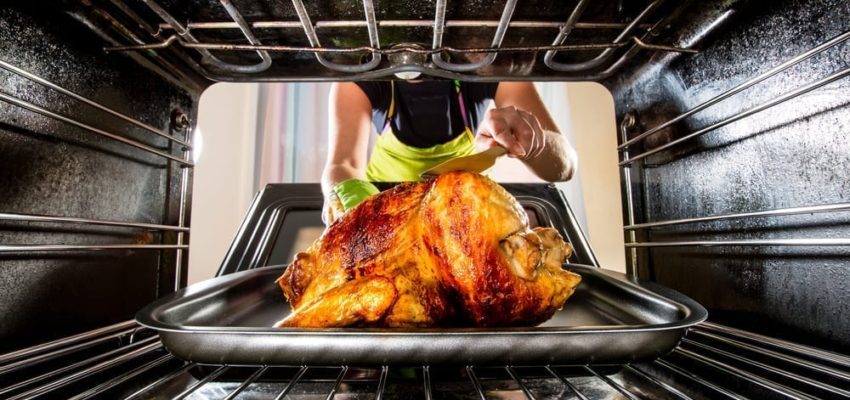Prevent A Cooking Fire – Fire Prevention Tips, Part 4 of 4

It’s Fire Prevention Week!
In honor of the National Fire Protection Association’s (NFPA) Fire Prevention Week, Bearingstar has created four fire safety blogs that have lots of smart ways to keep a fire-related tragedy from happening to you and your loved ones this fall and throughout the winter months.
Following is the final edition of a four-part blog series featuring precautions you and your family can take to keep your Massachusetts and Connecticut home safe from a cooking fire emergency.
Safety Precautions You Can Take To Avoid A Cooking Fire
The biggest eating holidays of the year are quickly approaching, and we know you and your family are probably going to be spending lots of time in the kitchen preparing for the festive meals. The Bearingstar team wants to make sure that your food makes a lasting impression on your guests because it tastes so delicious, and not because it caused a cooking catastrophe.
The National Fire Protection Association (NFPA) estimates that per year an average of 162,400 home structure fires involve cooking equipment, and they cost $1.1 billion in direct property damage. What’s the peak day for home cooking fires? Unfortunately, Thanksgiving is, followed closely behind by Christmas Day and Christmas Eve.
Distracted cooking tops the list of reasons why a cooking fire can start. Here are the revealing facts from an NFPA survey.
- 42% of people surveyed said they left the kitchen to talk or text on the phone
- 35% left to use the computer or check email while the food was cooking
- 45%, or nearly half, left the room to watch t.v. or listen to music
As inconceivable as it may seem, a startling one in 10 adults has actually left their home completely while cooking!
Just like multi-tasking while driving is a no-no, so is losing your focus on your cooking. We know it’s very tempting to check in on a game, text happy holiday messages to family, or maybe even take out the trash so that you don’t have to do it later. However, leaving the stove or oven unattended could have greater consequences than just burning your holiday dishes.
Other dangerous cooking behaviors include disabling your smoke alarm while cooking, not cleaning up excess grease or food, not having a fire extinguisher nearby, and forgetting to turn off burners, or mistakenly turning them on.
And if you think that you are safe from cooking fire hazards because you intend to use a microwave for some of your food prep this year, think again. According to the NFPA, during 2007-2011, U.S. fire departments responded, per year, to an average of 7,100 home structure fires in which a microwave oven was involved in ignition. So use the same caution with a microwave as you do with the stove and oven.
How To Safely Deep Fry Your Turkey
Lastly, if you are planning to deep-fry your turkey this year, there are special cooking fire concerns that you need to be aware of and precautions you should take, including:
- First, read and follow all the manufacturer’s instructions and warnings included with your deep fryer, and follow their instruction in all instances even if it’s different from what you read here, or anywhere else
- Make sure your fryer is not only steady but that it is never left unattended because it can easily tip over, spilling hot cooking oil over a large area. This means that you may be standing out in the cold for a couple of hours, so make sure you have someone to relieve you if you need to go inside for any reason.
- Do not overfill the cooking pot as it could cause cooking oil to spill when the turkey is put in
- Be cautious of even a small amount of cooking oil spilling on a hot burner because that can cause a large fire
- Always use a deep fryer with temperature controls to make sure it does not overheat the oil to the point of starting a fire
- Handle the sides of the cooking pot, lid and pot handles with extreme caution and with proper protection as they can get dangerously hot
- Children and pets should be nowhere near a deep-frying setup
- Do not drink and fry
- There are indoor and outdoor fryers, so use the equipment as intended; never use an outdoor frying setup indoors or in any enclosed or covered space, and never use an indoor fryer outdoors.
Even cooking experts agree that deep frying a turkey is an inherently dangerous undertaking, and though you may take all of the necessary precautions, hurting yourself and others is quite possible considering you are heating up gallons of oil to 350°F using a big propane burner and lowering a frozen turkey into it. So before you choose this method, consider whether the promise of a juicier bird is a good enough reason to take on this increased risk.
Whether you are in your own home for the Holidays, or gathering a friend or family member’s home, we want you to have a wonderful, stress-free time. Please take cooking safety seriously to ensure that it will be a joyous season for all.
Above all, we want you to know that Bearingstar Insurance is here for you. Our experienced insurance professionals are happy to answer your fire prevention questions or concerns, in Massachusetts and Connecticut. Whether you are a home or condo owner, or a renter, you can feel confident you will receive compassionate and excellent customer support should you ever need to file a claim for smoke or fire damage. Contact us for more information.
Read past blogs from this series on Safe Yard Waste Removal, Fireplace and Chimney Safety, and Smoke Alarms.
Back to Blog